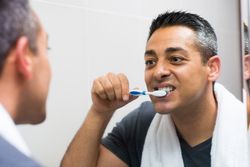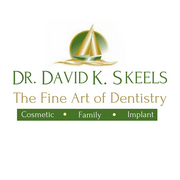
Tooth sensitivity occurs when a nerve becomes exposed, usually around the tooth root or in areas where the enamel has eroded. If you have sensitive teeth, you might experience sharp, sudden pain in a tooth or multiple teeth when you encounter a trigger food or drink, like ice cream or hot soup. Some people also have increased sensitivity during the winter when the air around them is cold, or when they bite or clench their jaw. The following guide will help inform your next discussion with a family dentist about tooth sensitivity and your treatment options.
What Causes Sensitive Teeth?
About one in eight people have sensitive teeth, which can be caused by a number of conditions, including:
- Overzealous brushing
- Acidic foods, like citrus fruits and coffee
- High-sugar and high-carbohydrate diet
- Gum disease and/or recession
- Cracked tooth
- Cavities
- Bruxism
- Teeth whitening
How Are Sensitive Teeth Treated?
Use Desensitizing Toothpaste
Look for a compound containing potassium nitrate—this ingredient desensitizes the nerve endings in your teeth and gums, which send pain signals to the brain. Some brands also contain ingredients that help restore the enamel coating around your teeth.
Stop Bleaching Your Teeth
People who whiten their teeth often experience temporary sensitivity for a day or two after treatment. If you regularly use at-home whitening strips or other bleaching products, take a break for a few days and see if your symptoms resolve on their own. A cosmetic dentist might also be able to provide an in-office teeth whitening treatment with fewer side effects.
Switch to a Soft-Bristle Toothbrush
 Some people brush too aggressively, which can cause the enamel to wear down and exposes the sensitive dentin. Talk to your family dentist about the appropriate brushing techniques, and use a soft-bristle toothbrush going forward. In general, you should brush at a 45-degree angle for about two minutes twice a day. Also, switch to a water flosser instead of flossing with dental thread, which can be too abrasive.
Some people brush too aggressively, which can cause the enamel to wear down and exposes the sensitive dentin. Talk to your family dentist about the appropriate brushing techniques, and use a soft-bristle toothbrush going forward. In general, you should brush at a 45-degree angle for about two minutes twice a day. Also, switch to a water flosser instead of flossing with dental thread, which can be too abrasive.
Prevent Teeth Grinding
Stress is one of the most common triggers for bruxism. If you clench your jaw throughout the day or gnash your teeth at night, use relaxation exercises to relieve tension. A family dentist can also recommend a mouthguard or splint to protect your teeth and jaw.
Receive Gum Treatment
If gum recession or disease creates sensitivity in your mouth, a dentist might recommend more frequent flossing or even a gum graft. Certain medications, including asthma inhalers, aspirin, hormonal birth control, chemotherapy, and immunosuppressants, can affect periodontal health; gum recession is also more common in people over the age of 40.
If you have sensitive teeth, don’t grin and bear it. A family dentist can completely resolve the issue in only a matter of weeks. To learn more about tooth sensitivity and other conditions, turn to the trusted experts at the practice of Dr. David K. Skeels in Rochester, NY. Dr. Make an appointment by calling (585) 467-7000 today, or visit the practice online for details.
About the Business
Have a question? Ask the experts!
Send your question

